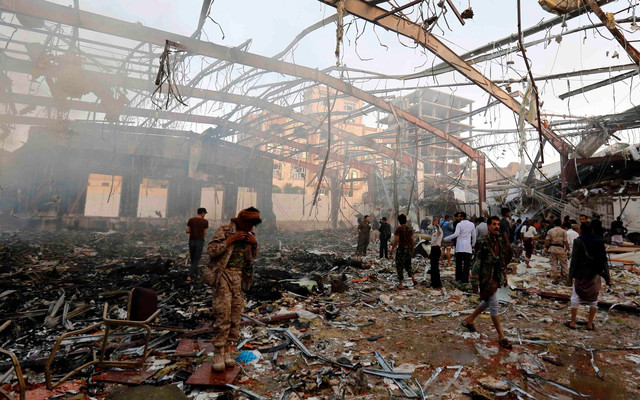On 8 October 2016, the Saudi Arabia-led coalition bombed a crowded funeral reception hall in Sana’a, Yemen, killing more than 140 and injuring more than 525 Yemenis. This is only one of the coalition’s most recent deadly attacks on civilians and civilian infrastructure in Yemen. Since its entry into the conflict in Yemen in March 2015, the Saudi coalition has conducted numerous airstrikes on civilian targets, including hospitals, weddings, markets, schools, and a refugee camp. These attacks have resulted in hundreds of civilian deaths and are potential violations of international humanitarian law (IHL). In conducting these airstrikes against civilian targets, Saudi Arabia and its coalition allies have flouted their ethical and legal responsibility to protect noncombatants per IHL. The coalition should halt its attacks immediately and allow an independent and impartial international body to investigate these violations.
The funeral was for the father of Galal al-Rawishan, an ally of the Houthis, who is serving as the interior minister of the Houthi-led government. His memorial service was held in a large reception hall often used for weddings and funeral ceremonies in an upscale district in Sana’a. While it is not clear how many people attended the ceremony, the hall has a capacity of up to 1,000. Among those in attendance were several senior Houthi officials including al-Rawishan, leaders of allied tribes, and Sana’a’s mayor, Abdulkader Hilal, who was also killed in the attack. The attack on the crowded hall resulted in such a large number of casualties that nearby hospitals were quickly overwhelmed and the Ministry of Health broadcast pleas over the radio asking off-duty doctors to help tend to the wounded.
The attack drew widespread international condemnation, including from the UN High Commissioner for Human Rights. The High Commissioner, Zeid Ra’ad al-Hussain, criticized the attack as “outrageous” and deplored the “increasingly horrific levels of civilian casualties.” He reiterated his call for an independent, international inquiry into potential violations of IHL. There have been previous calls for an independent UN-led international investigation into the Saudi-led coalition’s conduct in the conflict, specifically concerning potential breaches of IHL over its repeated killing of civilians. During the 33rd session of the Human Rights Council in September 2016, the Netherlands led calls for the establishment of such an inquiry. However, the Saudi government and its allies fended off the resolution, and ultimately led the passage of a compromise resolution leaving intact the criticized Saudi-led Yemeni National Inquiry.
IHL seeks to protect non-combatants during a time of war, including medical personnel, journalists, and other civilian populations. Saudi Arabia acceded to the Geneva Conventions, the central IHL texts, in 1963 with no reservations. It therefore has a legal responsibility to comply with IHL and to respect and protect civilians. Despite this, the Saudi coalition has continued to strike civilian targets, resulting in the death of thousands of non-combatants. In addition to its legal responsibility to adhere to IHL, Saudi Arabia has an ethical responsibility to respect civilians’ status as non-combatants. However, Saudi airstrikes have deliberately crippled and destroyed civilian infrastructure, including water, health, and education systems. For example, in early 2016, the coalition attacked a reservoir in Sana’a that provided water to 30,000 people and a desalinization plant near water-starved Ta’izz. These attacks affect tens of thousands of Yemenis and do not discriminate. They affect all people, regardless of age or political affiliation. Yemen is already suffering a severe humanitarian crisis and the indiscriminate nature of attacks on civilians and civilian infrastructure only deepens the pain of the war.
The Saudi-led coalition’s recent bombing of a crowded funeral hall is the latest example of Saudi Arabia and its coalition allies’ apparent disregard for civilian life. In attacks on hospitals, weddings, and markets, the coalition has repeatedly defied IHL and its legal and ethical responsibilities to avoid targeting non-combatants. Saudi Arabia should immediately halt all airstrikes in Yemen and allow an independent and impartial international inquiry to investigate the coalition for potential violations of international humanitarian law.
Tyler Pry is the Sheikh Nimr al-Nimr Advocacy Fellow at ADHRB





